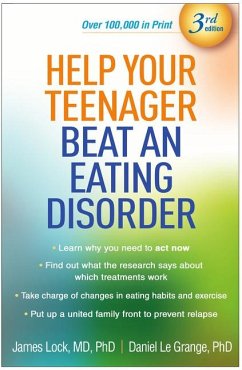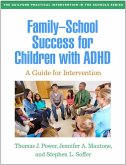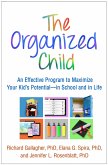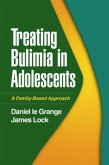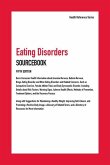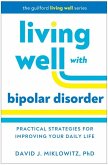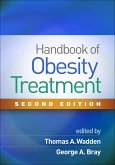- Gebundenes Buch
- Merkliste
- Auf die Merkliste
- Bewerten Bewerten
- Teilen
- Produkt teilen
- Produkterinnerung
- Produkterinnerung
This trusted, groundbreaking resource has helped many tens of thousands of parents play an active role in recovery when their teenager's dieting, working out, or body image concerns cross the line. Treatment experts James Lock and Daniel Le Grange separate fact from myth about anorexia nervosa, bulimia nervosa, binge-eating disorder, and avoidant/restrictive food intake disorder (ARFID).
Andere Kunden interessierten sich auch für
![Family-School Success for Children with ADHD Family-School Success for Children with ADHD]() Thomas J PowerFamily-School Success for Children with ADHD58,99 €
Thomas J PowerFamily-School Success for Children with ADHD58,99 €![The Organized Child The Organized Child]() Richard GallagherThe Organized Child52,99 €
Richard GallagherThe Organized Child52,99 €![Treating Bulimia in Adolescents Treating Bulimia in Adolescents]() Daniel Le GrangeTreating Bulimia in Adolescents61,99 €
Daniel Le GrangeTreating Bulimia in Adolescents61,99 €![Eating Disorders Sourcebk 5/E Eating Disorders Sourcebk 5/E]() Angela L WilliamsEating Disorders Sourcebk 5/E83,99 €
Angela L WilliamsEating Disorders Sourcebk 5/E83,99 €![Understanding Eating Disorders Understanding Eating Disorders]() Danielle Beck-EllsworthUnderstanding Eating Disorders256,99 €
Danielle Beck-EllsworthUnderstanding Eating Disorders256,99 €![Living Well with Bipolar Disorder Living Well with Bipolar Disorder]() David J MiklowitzLiving Well with Bipolar Disorder29,99 €
David J MiklowitzLiving Well with Bipolar Disorder29,99 €![Handbook of Obesity Treatment Handbook of Obesity Treatment]() Handbook of Obesity Treatment97,99 €
Handbook of Obesity Treatment97,99 €-
-
-
This trusted, groundbreaking resource has helped many tens of thousands of parents play an active role in recovery when their teenager's dieting, working out, or body image concerns cross the line. Treatment experts James Lock and Daniel Le Grange separate fact from myth about anorexia nervosa, bulimia nervosa, binge-eating disorder, and avoidant/restrictive food intake disorder (ARFID).
Produktdetails
- Produktdetails
- Verlag: Guilford Publications
- 3rd edition
- Seitenzahl: 286
- Erscheinungstermin: 28. Mai 2025
- Englisch
- Abmessung: 229mm x 152mm x 21mm
- Gewicht: 567g
- ISBN-13: 9781462557813
- ISBN-10: 1462557813
- Artikelnr.: 72653656
- Herstellerkennzeichnung
- Libri GmbH
- Europaallee 1
- 36244 Bad Hersfeld
- gpsr@libri.de
- Verlag: Guilford Publications
- 3rd edition
- Seitenzahl: 286
- Erscheinungstermin: 28. Mai 2025
- Englisch
- Abmessung: 229mm x 152mm x 21mm
- Gewicht: 567g
- ISBN-13: 9781462557813
- ISBN-10: 1462557813
- Artikelnr.: 72653656
- Herstellerkennzeichnung
- Libri GmbH
- Europaallee 1
- 36244 Bad Hersfeld
- gpsr@libri.de
James Lock, MD, PhD, is the Eric Rothenberg, MD, Professor of Child Psychiatry and Pediatrics at Stanford University and Director of the Stanford Child and Adolescent Eating Disorders Program. Dr. Lock is committed to providing evidence-based treatments to children, adolescents, and their families. He is a Distinguished Fellow of the American Psychiatric Association and the American Academy of Child and Adolescent Psychiatry, and a recipient of the Agnes Purcell McGavin Award for Distinguished Career Achievement in Child and Adolescent Psychiatry from the American Psychiatric Association, the Price Family Foundation Award for Research Excellence from the National Eating Disorders Association, the Leadership Award in Research from the Academy of Eating Disorders, and Early and Mid-Career Development Awards from the National Institute of Mental Health. Daniel Le Grange, PhD, is Benioff UCSF Professor in Children's Health in the Department of Psychiatry and Behavioral Sciences and UCSF Weill Institute for Neurosciences and Director of the Eating Disorders Program at the University of California, San Francisco. He is Emeritus Professor at the University of Chicago, where he was Director of the Eating Disorders Program until 2014. Dr. Le Grange trained at the Institute of Psychiatry, Psychology and Neurology, University of London, and was a member of the team at the Maudsley Hospital in London that developed family-based treatment for anorexia nervosa. Over his career, he has treated numerous adolescents and families struggling with eating disorders. He is a recipient of the Leadership Award in Research from the Academy of Eating Disorders and an Early Career Development Award from the National Institute of Mental Health, and is a Fellow of the Academy of Eating Disorders.
I. Getting Started: First Steps toward Helping Your Child with an Eating
Disorder
1. Act Now
2. Get Together
3. Don't Waste Time on "Why?"
II. Understanding Eating Disorders
4. Know What You're Dealing With: The Complexity of Eating Disorders
5. Get Into Your Child's Head: The Distorted Thinking Behind Your
Teenager's Behavior
6. Understand Your Options: What the Research Says about the Best Ways to
Treat Anorexia Nervosa, Bulimia Nervosa, Binge Eating Disorder, and
Avoidant/Restrictive Food Intake Disorder
III. Making Treatment Work: How to Solve Everyday Problems to Help Your
Child Recover
7. Taking Charge of Change: How to Apply Family Based Treatment to Help
with Eating Disorders
8. Playing a Supporting Role: Other Ways You Can Be a Part of Your Child's
Recovery
9. Harnessing the Power of Unity: How to Stay on the Same Page in Your
Fight against Eating Disorders
10. Staying Empowered and Informed: How to Work with Professionals Who Are
Trying to Help Your Child
Resources
Further Reading
Index
Disorder
1. Act Now
2. Get Together
3. Don't Waste Time on "Why?"
II. Understanding Eating Disorders
4. Know What You're Dealing With: The Complexity of Eating Disorders
5. Get Into Your Child's Head: The Distorted Thinking Behind Your
Teenager's Behavior
6. Understand Your Options: What the Research Says about the Best Ways to
Treat Anorexia Nervosa, Bulimia Nervosa, Binge Eating Disorder, and
Avoidant/Restrictive Food Intake Disorder
III. Making Treatment Work: How to Solve Everyday Problems to Help Your
Child Recover
7. Taking Charge of Change: How to Apply Family Based Treatment to Help
with Eating Disorders
8. Playing a Supporting Role: Other Ways You Can Be a Part of Your Child's
Recovery
9. Harnessing the Power of Unity: How to Stay on the Same Page in Your
Fight against Eating Disorders
10. Staying Empowered and Informed: How to Work with Professionals Who Are
Trying to Help Your Child
Resources
Further Reading
Index
I. Getting Started: First Steps toward Helping Your Child with an Eating
Disorder
1. Act Now
2. Get Together
3. Don't Waste Time on "Why?"
II. Understanding Eating Disorders
4. Know What You're Dealing With: The Complexity of Eating Disorders
5. Get Into Your Child's Head: The Distorted Thinking Behind Your
Teenager's Behavior
6. Understand Your Options: What the Research Says about the Best Ways to
Treat Anorexia Nervosa, Bulimia Nervosa, Binge Eating Disorder, and
Avoidant/Restrictive Food Intake Disorder
III. Making Treatment Work: How to Solve Everyday Problems to Help Your
Child Recover
7. Taking Charge of Change: How to Apply Family Based Treatment to Help
with Eating Disorders
8. Playing a Supporting Role: Other Ways You Can Be a Part of Your Child's
Recovery
9. Harnessing the Power of Unity: How to Stay on the Same Page in Your
Fight against Eating Disorders
10. Staying Empowered and Informed: How to Work with Professionals Who Are
Trying to Help Your Child
Resources
Further Reading
Index
Disorder
1. Act Now
2. Get Together
3. Don't Waste Time on "Why?"
II. Understanding Eating Disorders
4. Know What You're Dealing With: The Complexity of Eating Disorders
5. Get Into Your Child's Head: The Distorted Thinking Behind Your
Teenager's Behavior
6. Understand Your Options: What the Research Says about the Best Ways to
Treat Anorexia Nervosa, Bulimia Nervosa, Binge Eating Disorder, and
Avoidant/Restrictive Food Intake Disorder
III. Making Treatment Work: How to Solve Everyday Problems to Help Your
Child Recover
7. Taking Charge of Change: How to Apply Family Based Treatment to Help
with Eating Disorders
8. Playing a Supporting Role: Other Ways You Can Be a Part of Your Child's
Recovery
9. Harnessing the Power of Unity: How to Stay on the Same Page in Your
Fight against Eating Disorders
10. Staying Empowered and Informed: How to Work with Professionals Who Are
Trying to Help Your Child
Resources
Further Reading
Index

